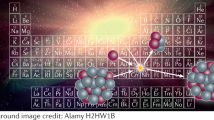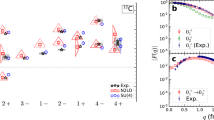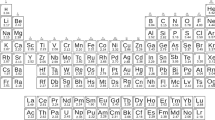Abstract
SINCE in an elaborate criticism of Bohr's theory on the constitution of atoms and molecules, Prof. J. W. Nicholson, as in his letter to NATURE (February 5, p 630), comes to the conclusion (Phil. Mag., xxvii., p. 560, 1914) that the valencies of lithium, beryllium, boron, etc., on Bohr's theory are not in accord with experience, and if the electrons in the atoms are to be in one plane, we must either abandon Bohr's method of calculating valency—and (generally) Bohr's theory of the atoms more complex than hydrogen and helium—or give up van den Broek's hypothesis, that the charge of the nucleus of Rutherford's atom is equal to the atomic number (which hypothesis was accepted by Bohr as one of his fundamental assumptions), I may be allowed to add some remarks to my previous letter on this subject (NATURE, March 5, 1914).
This is a preview of subscription content, access via your institution
Access options
Subscribe to this journal
Receive 51 print issues and online access
$199.00 per year
only $3.90 per issue
Buy this article
- Purchase on Springer Link
- Instant access to full article PDF
Prices may be subject to local taxes which are calculated during checkout
Similar content being viewed by others
Author information
Authors and Affiliations
Rights and permissions
About this article
Cite this article
VAN DEN BROEK, A. The Structure of Atoms and Molecules. Nature 93, 241–242 (1914). https://doi.org/10.1038/093241b0
Issue Date:
DOI: https://doi.org/10.1038/093241b0
This article is cited by
-
Resisting the Bohr Atom: The Early British Opposition
Physics in Perspective (2011)
Comments
By submitting a comment you agree to abide by our Terms and Community Guidelines. If you find something abusive or that does not comply with our terms or guidelines please flag it as inappropriate.



